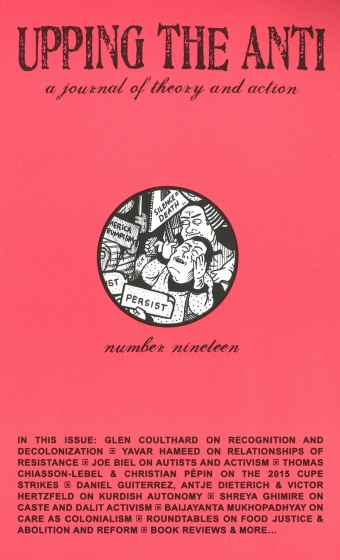10 Years of Upping the Anti
Dear UTA,
Thank you for inviting me, as founder and publisher of Canadian Dimension (CD), to comment on Sharmeen Khan’s reflections on 10 years of publishing UTA. Not at all an easy assignment. Our first decade was 1963 to 1973, “the sixties,” as it’s properly referred to, a very different time to start a magazine than the founding decade of UTA. Further, we did not start as a collective, a model that was only to emerge in our second decade.
One of the things that impressed me about Sharmeen’s account is that the founders of UTA had a very clear and definitive vision of the journal as “an internal publication for the movement.” When CD first appeared, the movement was just beginning to take shape, arising from the opposition to the American war against Vietnam, newfound Canadian nationalism, Québec nationalism, the New Left, the student uprising, and women’s liberation. Contrary to UTA, CD’s politics was at first ill-defined. We had no theory and no movement-building experience. We frantically adapted, as both came suddenly and in torrents. Seemingly instantly, CD was producing theory and debating strategy. As editors we could barely keep up and were forced to increase the frequency of publication from six to eight issues and from 48 to 64 pages or more. My basement was our first office. Until we could hire an office manager, a neighbour volunteered to handle subscriptions and sales which quickly exploded from a few hundred, to a thousand, to three thousand, then five thousand. Until I hired Alvin Finkle, then a graduate student, as assistant editor, I did most of the editing. It became a full-time non-paying job which I managed to do while teaching full-time at the University of Manitoba.
Before the advent of the internet the CD collective was entirely Winnipeg-based. This had its advantages. We met weekly or bi-weekly. Our meetings were often intense and argumentative, as we discussed who we should solicit articles from and how we evaluated submissions. But it also had disadvantages. Winnipeg is not Toronto. There was no pool of experienced editors with contacts across the country. And few had any interest in the business of raising money and expanding circulation. These limitations mostly disappeared towards the end of the 1990s when the collective expanded across the country by way of the internet. But we also lost the intimacy and closeness of face-to-face meetings. Some of the new members who joined the collective back then have been with the magazine ever since. Andrea Levy of Montréal in particular has become an indispensible member of the CD collective. As the online collective grew larger and larger, finally reaching 30 (many of whom barely participated in the work of the magazine), and as my participation became impaired by a series of serious illnesses, CD fell into crisis requiring a major restructuring. We replaced the largely dysfunctional collective with a much smaller coordinating committee that meets weekly over Skype.
I am impressed by how extensively UTA editors work with authors to get the results they want. Except for striving to avoid academic and sectarian jargon, for a variety of reasons CD has never operated with such a tightly-knit model. We have always aimed for a plurality of voices on the Left and encouraged debate among diverse perspectives. This was not always easy. In the early years there were tensions between New Left and social democratic politics and between electoral and extra-parliamentary priorities. From the mid 1970s and 1980s, largely as a result of the Waffle experience, CD struggled to free itself from its social democratic origins and give full and consistent expression to a harder edge anti-capitalist ideology. Over the same period there were sharp debates on how to relate to demands for Québec sovereignty. For most of CD’s 50-plus years, the magazine has been preoccupied with questions about Canada’s role in the global economy and particularly its relationship to the American Empire. As we moved heavily into discussions of the personal as political, issues of identity politics divided both the collective and our readers. Finally, early in the new century as sensitivity to the plundering of the environment took root, CD made a fairly easy transition to ecosocialism.
Canadian Dimension and Upping the Anti are very different publications, but I venture that in light of our longer history, UTA in its second decade will be facing some of the same issues that we have had to deal with—and are still dealing with: how to relate to new movements; how to cope with divisions among contributors and readers; how to break free of its Toronto academic enclave and engage more contributors and readers from across the country. I look forward to the next ten years of UTA!
Readers who may wish to learn more about Canadian Dimension can acquire a copy of Cy Gonick, ed., Canada Since 1960: A Left Perspective on 50 Years of Politics, Economics and Culture (Lorimer, 2016). Available in bookstores or from Canadian Dimension: info@canadiandimension.com.
In solidarity,
Cy Gonick
Winnipeg, MB

